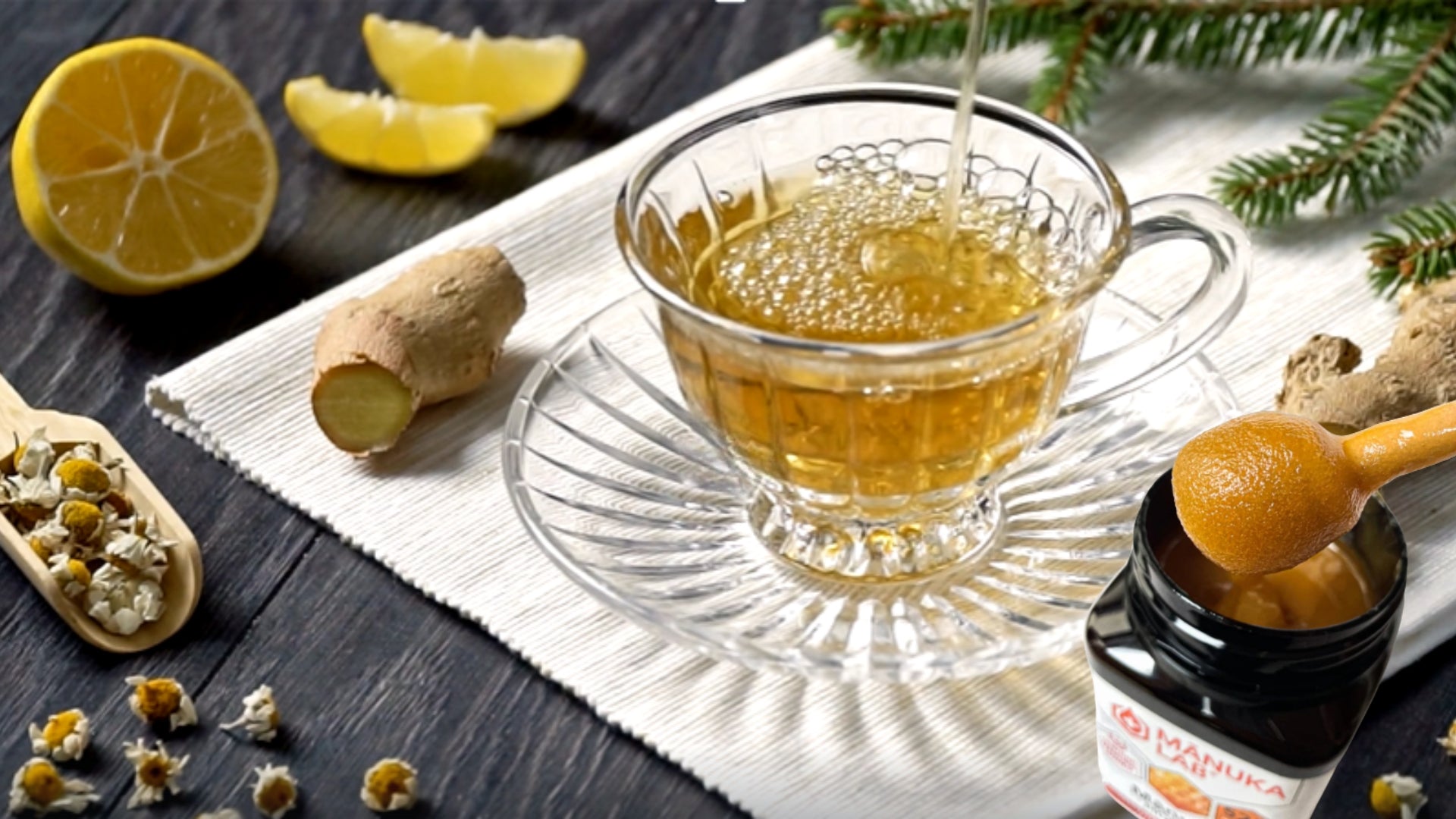

Mānuka honey lemon ginger tea is more than just a comforting warm drink. With roots in natural wellness traditions, this powerful trio of ingredients has been embraced by cultures across the world for centuries. In modern times, it continues to be celebrated for its immune-supporting properties, digestive benefits, and ability to soothe sore throats and aid relaxation.
In this article, we will explore the background of this natural remedy, provide a simple recipe for making it at home, delve into its key health benefits, and offer tips on when and how to enjoy it for maximum effect.
What is Mānuka Honey Lemon Ginger Tea?
At its core, Mānuka honey lemon ginger tea is a hot infusion combining fresh ginger root, lemon juice or slices, and Mānuka honey. It is commonly consumed for its soothing properties, especially during cold and flu season, or as a daily wellness tonic.
Each component brings unique nutritional and therapeutic properties:
-
Ginger (Zingiber officinale) is a flowering plant whose root has been used in traditional medicine for thousands of years. It contains active compounds like gingerol, known for anti-inflammatory and antioxidant effects.
-
Lemon (Citrus limon) is a citrus fruit rich in vitamin C, antioxidants, and flavonoids that support immune health and help reduce oxidative stress.
-
Mānuka honey is a monofloral honey from New Zealand, produced by bees pollinating the Leptospermum scoparium (mānuka bush). It contains a unique compound called methylglyoxal (MGO), giving it its notable antibacterial activity.
Together, these ingredients create a nourishing drink that supports overall wellbeing.
Brief History and Background
The use of herbal infusions for wellness dates back to ancient civilisations. Ginger tea has long been part of Chinese and Ayurvedic medicine. Lemon was later introduced into herbal concoctions for its refreshing taste and vitamin C content. Honey, especially raw honey, has a history as both food and medicine in cultures ranging from Ancient Egypt to Indigenous communities.
Mānuka honey, in particular, has gained international recognition since the 1980s, when researchers in New Zealand began studying its antibacterial properties. Unlike other types of honey, Mānuka honey's efficacy is not solely due to hydrogen peroxide but also to MGO, which remains stable under heat and light.
The combination of these three ingredients into one tea offers a balanced drink that supports digestive health, immune resilience, and respiratory function.
How to Make Mānuka Honey Lemon Ginger Tea
Making Mānuka honey lemon ginger tea at home is straightforward and requires only a few fresh, high-quality ingredients.
Ingredients (Serves 1):
-
1 cup (250ml) of freshly boiled water
-
1–2 teaspoons of Mānuka honey (MGO 200+ or higher recommended)
-
1 tablespoon of freshly grated or thinly sliced ginger root
-
Juice of half a lemon (or 2–3 lemon slices)
-
Optional: a pinch of turmeric or black pepper for added anti-inflammatory properties
Method:
-
Prepare the ginger
Peel the ginger root and slice or grate it. The finer it is prepared, the more flavour and beneficial compounds will be released into the tea. -
Boil water
Bring a cup of water to a boil. Pour it over the ginger in a heatproof mug or teapot. -
Steep
Let the ginger steep for around 5–10 minutes. Covering the mug helps retain the volatile oils and heat. -
Add lemon
Squeeze in the juice of half a lemon or add fresh slices to the mug. -
Add Mānuka honey
Once the tea has cooled slightly (to around 40–45°C), stir in the Mānuka honey. Avoid adding honey to boiling water, as very high temperatures can degrade some of its bioactive compounds. -
Stir and enjoy
Stir gently and sip slowly. Best enjoyed warm.
This drink can be consumed up to three times a day. It’s also safe to refrigerate for up to 24 hours and reheat gently if needed.
Health Benefits of Mānuka Honey Lemon Ginger Tea
This tea is valued not only for its comforting warmth but for the synergy of its ingredients. Here are some of the most notable health benefits:
1. Immune System Support
-
Vitamin C from lemon helps maintain healthy immune cells and defends against seasonal infections.
-
Mānuka honey offers antibacterial and antimicrobial activity, helping combat minor infections.
-
Ginger contains antioxidants like gingerol and shogaol, which support immune modulation and inflammatory balance.
2. Soothing Sore Throats and Coughs
Mānuka honey coats the throat, helping reduce irritation, suppress cough reflex, and provide antimicrobial action in the upper respiratory tract. This is particularly beneficial during colds, flu, or laryngitis. Ginger further helps to reduce inflammation in the throat and chest.
3. Digestive Aid
Ginger is a traditional remedy for nausea, indigestion, bloating, and gas. Its carminative properties help relax the gastrointestinal muscles. Lemon stimulates the production of bile, aiding fat digestion, while Mānuka honey has prebiotic properties that support a healthy gut microbiome.
4. Anti-Inflammatory Effects
Ginger contains compounds that have been shown to inhibit the production of pro-inflammatory cytokines. Mānuka honey's methylglyoxal content has also been studied for its role in reducing inflammation and oxidative stress. Regular consumption may help reduce low-grade inflammation in the body.
5. Hydration and Skin Health
Warm herbal teas like this one contribute to overall hydration. The vitamin C in lemon is vital for collagen synthesis, while Mānuka honey’s antioxidants may support clearer skin from within.
6. Support for Mild Cold and Flu Symptoms
When taken at the onset of a cold, this tea may help reduce the severity and duration of symptoms such as chills, congestion, fatigue, and sore throat. Its warming nature makes it ideal during colder months.
When Should You Drink It?
This tea can be consumed:
-
First thing in the morning to stimulate digestion and support detoxification.
-
Midday for a soothing digestive boost or immune support.
-
In the evening as a calming ritual before bed, especially if experiencing cold symptoms.
However, due to the lemon's acidity and ginger's stimulating properties, some may prefer to avoid it on an empty stomach if they are prone to acid reflux. It is generally well-tolerated and suitable for most individuals.
Choosing the Right Mānuka Honey
To ensure the effectiveness of your tea, it’s important to choose a genuine and high-grade Mānuka honey. Look for:
-
A clearly stated MGO rating, which reflects the methylglyoxal content. MGO 250+ and above is considered suitable for wellness purposes.
-
Clear labelling and origin traceability to New Zealand.
-
Independent testing and batch traceability from reputable suppliers.
Avoid cheap imitations or generic blends labelled as 'active honey' without proper grading.
Storage Tips and Variations
-
Store your Mānuka honey in a cool, dry place. Do not refrigerate it.
-
You can prepare a concentrated version of the tea in advance by simmering ginger slices in water for 15–20 minutes, then adding lemon juice and honey once cooled. Store in the fridge and reheat portions as needed.
-
Add cinnamon for extra warmth or turmeric and black pepper for increased anti-inflammatory benefits.
Safety and Considerations
-
Mānuka honey should not be given to children under 12 months due to the risk of infant botulism.
-
If you have diabetes, monitor your blood sugar levels, as honey still contains natural sugars.
-
Those on blood-thinning medication or with gallbladder disease should consult a healthcare provider before consuming large amounts of ginger.
-
Allergic reactions to lemon or ginger are rare but possible.
Final Thoughts
Mānuka honey lemon ginger tea is more than a pleasant herbal drink. It is a time-tested natural remedy that brings together the best of traditional knowledge and modern scientific understanding. Whether you are seeking relief from a sore throat, a gentle aid to digestion, or simply a warming and nourishing beverage, this tea is a comforting addition to your daily wellness routine.
By selecting high-quality ingredients and preparing it mindfully, you can enjoy both the therapeutic benefits and the delightful flavours of this soothing infusion. Always listen to your body, and consider incorporating it into your diet as part of a balanced, health-supporting lifestyle.
Why Choose Manuka Lab for High-Quality Mānuka Honey
At Manuka Lab, we are committed to delivering premium Mānuka honey that meets the highest standards of purity, potency, and authenticity. Every jar of our honey is harvested from remote regions of New Zealand and independently tested to guarantee its MGO content, ensuring you receive the active compounds associated with genuine Mānuka honey. We provide full traceability from hive to jar, so you can trust exactly where your honey comes from and how it was produced. Whether you are using it in your wellness routine or as part of a soothing Mānuka honey lemon ginger tea, Manuka Lab honey offers the quality and consistency you can rely on.



